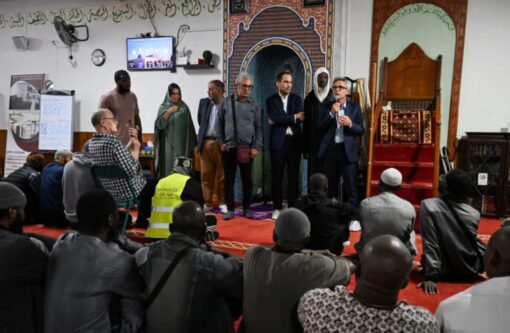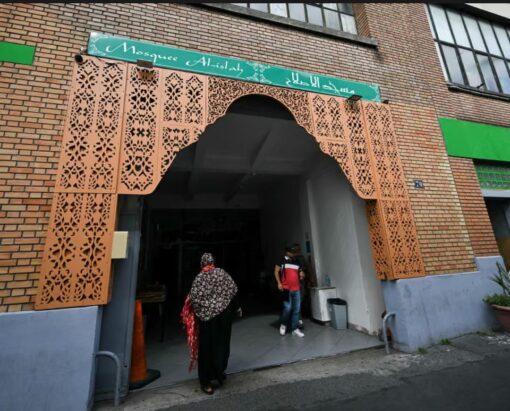The Muslim community in France has been placed on high alert after severed pig heads were discovered at the entrances of nine mosques across the country, in what religious leaders and rights groups are calling one of the most shocking acts of Islamophobic provocation in recent years.
Police confirmed that the gruesome findings were reported in multiple towns within a 24-hour period, prompting widespread outrage and urgent appeals for calm.
The France mosque attacks have stirred fears of escalating hostility toward Muslims at a time when debates around identity, religion, and integration continue to dominate French politics.
Images circulated online showing decapitated pig heads left outside gates, courtyards, and prayer halls. For many worshippers, the act was not only an insult but a direct attempt to spread fear.
A spokesman for one of the targeted mosques described the scene as devastating. “When our members arrived for the dawn prayer, they were confronted with severed pig heads at the entrance. It was not just disgusting, it was designed to humiliate us,” he said. “This is not only an attack on Muslims, it is an attack on the values of the Republic.”

The incidents have sparked condemnation from political and religious leaders alike. France’s Interior Minister vowed that those responsible would be found and prosecuted.
“There is no place for hatred or desecration of places of worship in our country. France guarantees freedom of religion, and we will defend that principle with determination,” he declared.
Local Muslim leaders, however, say such promises have been made before and that Islamophobic attacks often go unpunished. One imam in Lyon, whose mosque was among those defiled, said the symbolism of the act could not be ignored.
“The pig is considered impure in Islam. To leave severed heads at our doors is a calculated attempt to insult our faith and terrorize our community,” he explained. “The question is: what will the authorities actually do about it?”
Rights organizations quickly linked the attacks to a broader pattern of hostility that Muslims in France say has worsened over the past decade.
A representative from the Collective Against Islamophobia in France argued that the incidents reflect an environment where anti-Muslim rhetoric has become normalized.
“When politicians and media personalities constantly present Muslims as outsiders or threats, it gives extremists permission to act,” he said. “The France mosque attacks are not isolated—they are the product of years of stigmatization.”
Witnesses in some towns reported seeing masked individuals near mosque compounds during the night, though police have not confirmed any arrests.
Investigators are analyzing CCTV footage from the affected areas, and forensic teams have been dispatched to collect evidence from the scenes. Officials have urged citizens not to spread rumors online as speculation grows about coordinated planning behind the incidents.
For France’s nearly six million Muslims, the discoveries have reopened old wounds. Many recall a string of previous attacks on mosques, ranging from vandalism to arson.
In 2019, a mosque in Bayonne was targeted in a shooting that left two elderly men seriously wounded. In the aftermath of that attack, leaders had called for stronger protections, but many say those calls were ignored.
“How many times must we be attacked before serious security measures are taken?” asked a community organizer in Paris. “We are citizens of this country, yet we are treated like perpetual targets.”
The timing of the attacks has also fueled speculation. They come amid heated political debates over immigration and secularism, with far-right groups increasingly vocal in their opposition to what they call “Islamization.”
Analysts suggest that the desecration of mosques is not only a hate crime but a deliberate political message aimed at stoking division ahead of local elections.
One political scientist noted, “It is important to see these France mosque attacks not just as criminal acts but as part of a climate where hate speech translates into hate crimes.”
The broader public reaction has been mixed. Many French citizens have taken to social media to denounce the attacks, with messages of solidarity shared under hashtags calling for unity.
Others, however, have expressed hostility, echoing anti-Muslim narratives that circulate widely online. This polarization underscores the challenges France faces in reconciling its secular values with the realities of its diverse population.
International reactions have also been swift. Leaders from Muslim-majority countries condemned the incidents and urged France to protect its religious minorities.
The Organization of Islamic Cooperation called the discovery of pig heads at mosques “a heinous and deliberate insult to Islam,” while Turkey’s foreign ministry described the events as proof of “rising Islamophobia in Europe.”
Diplomatic observers warned that if the government is perceived as failing to act decisively, the incidents could strain France’s relationships abroad.
French Jewish and Christian organizations have also expressed solidarity. A Catholic bishop released a statement declaring, “An attack on one faith is an attack on all. The desecration of mosques is an affront to human dignity, and we stand with our Muslim brothers and sisters.”
Leaders of Jewish groups drew parallels to the desecration of synagogues in past decades, warning that silence in the face of religious hatred only encourages further violence.
Despite the shock and condemnation, fear remains palpable among many worshippers. In Toulouse, families hesitated to attend Friday prayers after discovering one of the mosques had been desecrated earlier in the week. “Our children are asking us why people hate us so much,” said one mother. “What answer are we supposed to give?”
Activists argue that stronger government action is needed, not only in policing hate crimes but also in addressing the rhetoric that fuels them.
“We cannot separate the France mosque attacks from the larger environment where Muslims are constantly singled out,” said a lawyer who campaigns against discrimination. “The pig heads are not just about intimidation—they are the physical manifestation of words that politicians and pundits speak daily.”
In neighborhoods with large Muslim populations, community patrols have already been set up to watch over mosques, reflecting a lack of trust in official protection.

Volunteers say they have no choice but to guard their places of worship themselves. One volunteer explained, “We don’t want violence. We just want to make sure no one comes in the night again to insult our faith.”
While police investigations continue, the mood across the Muslim community remains tense. Calls for justice are growing louder, but many fear that the perpetrators will never be caught or, if caught, will face only minimal punishment.
The repeated pattern of mosque desecrations, community outrage, promises of action, and eventual fading from headlines has left many skeptical.
The France mosque attacks are forcing a national conversation about whether enough is being done to confront Islamophobia head-on. For some, the desecration of nine mosques with pig heads is an unforgivable insult that demands decisive action.
For others, it is a reminder that hatred, when left unchecked, grows bolder. What is certain is that for France’s Muslim community, the trauma of discovering severed pig heads at their places of worship will not soon be forgotten.
As one imam concluded in his Friday sermon, “We will not answer hate with hate. We will continue to pray for this country and for justice. But we also say clearly: we are citizens, and our dignity is not negotiable.”


